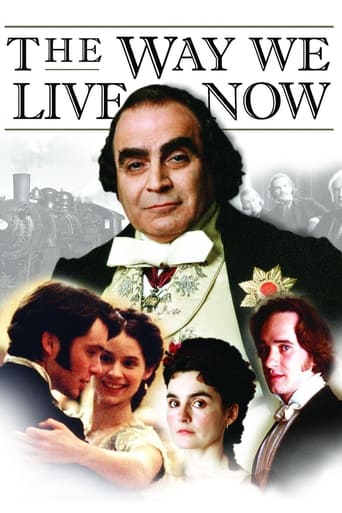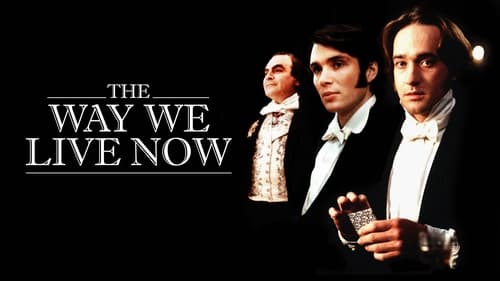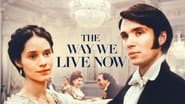richard-693
Anthony Trollope wrote the novel, but the TV mini-series was adapted by the brilliant Andrew Davies (also Pride and Prejudice). The book is a deep and witty dissection of the financial world of get-rich-quick. The mini-series catches Trollope's wit and lets us see what we could only imagine in the book. Few adaptations of classic fiction came off better than this one...maybe this is the best ever. The characters and themes are as contemporary as any story of financial disaster in the Wall Street Journal. Like MACBETH, THE WAY could successfully be set in modern times because it is a modern story; a timeless story. In this production, the sets, costumes, horses and trappings of London in the 1870's enrich the story. We watch THE WAY often and every showing reveals details we missed, but which delight.
George Parker
"The Way We Live Now", like most Victorian period satire, looks into the lives of numerous characters sorting through the intrigues and foibles of romance, wickedness, power, and the pursuit of peerage and property. A lightly perfumed costume flick which tilts unabashedly between comedy and drama, this story centers on a crude but rich businessman (Suchet) whose powerful performance is the backbone of the film. Side plots include an issue fraught romance, an attempt to marry into a fortune, a scheme to build a railroad from Utah to Mexico, cheating at love and cards, politics, a woman scorned, and much more. A four hour TV miniseries from the BBC, "The Way We Live Now" has plenty of time to sort through its many characters while tidying up at the end making it a busy and enjoyable Victorian period film. A should-see for anyone into BBC TV fare, Victorian period stories, and 19th century pulp fiction. (B+)
D.H.
A truly unique look at Trollope. The adaptation, direction and musical score are done with high style, wit and a decadent spirit that is rare in the more reserved British period pieces that one might expect from the BBC. It is immensely entertaining. I heartily recommend it.
MetaLark
Admiration for the abilities of screenwriter Andrew Davies led me to watch this miniseries. However, I'd have to call this a wasted effort on his part. Not having read the Trollope work on which it is based, nor having any desire to read it after viewing this film version, I can't say whether it is faithful to the original. But the main characters were generally too bizarre and unlikable for my taste, and two of the casting decisions--the parts of Paul Montague and Mrs. Hurtle--were positively grotesque.Paul Montague, the apparent hero of the piece, was supposed to be an American engineer, a person of some experience and expertise; no doubt the role called for a youngish man unaccustomed to smoky business dens, but this actor made him look like a fresh-faced adolescent--it's asking too much to suppose he could be believable in such a role. And trust me, no normal woman would fall in love with a character so effeminate--that's preposterous.And--bless my soul--Mrs. Hurtle; at first I was intrigued, thinking she was supposed to be a woman POSING as an American southern belle, a suspicious character in fact. I was astounded when it became apparent that she REALLY was supposed to be from the South; her accent was truly appalling, a caricature. A southern accent is generally so easy to mimic, it seems as though they must have searched hard for someone who couldn't do it. It was so gawd-awful that I still awaken sometimes in the middle of the night with her belabored diphthongs echoing in my nightmares.If these two mistakes had been less glaring, it is possible that the strangeness of the Melmotte characters might have been more tolerable. They certainly were interesting, and very well acted by David Suchet and Shirley Henderson. The latter has a particular gift for playing neurotic women, but she also was able to endow Marie Melmotte with some sweetness, and in the end, some sympathetic traits.4/10





